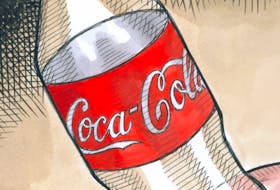In response to your Feb. 14th editorial, “Salmon under stress,” I would like to add that the Salmonid Council of Newfoundland and Labrador (SCNL) feels that wild Atlantic salmon stocks in this province are indeed under stress.
At our annual conference held last Sept. 30th, we heard from a number of scientists: Timothy Sheehan of the National Oceanic and Atmospheric Administration, Gary Maillet of DFO, Fran Mowbray of DFO and Geoff Veinott of DFO.
This is what we heard.
There was a major happening in the North Atlantic Ocean in 1989/90 which caused a change in water temperature. This, in turn, affected the plankton bloom, which is the major source of food for caplin. The caplin declined greatly in numbers, in size and in fat per gram. This resulted in a major collapse of all species which feed on caplin: cod, salmon, etc. Since the early 1990s, we have seen a very slow and gradual increase in Atlantic salmon and cod stocks, and our hopes were up. But three years ago we experienced another major happening in the Labrador Sea.
Again water temperatures changed, the plankton was later blooming and this resulted in the caplin stocks there maturing later. Hence we saw caplin spawning in N.L. in late July and August rather than in late May and June. The caplin stocks dropped dramatically and the caplin are much smaller.
Wild Atlantic salmon stocks in N.L. dropped 24 per cent from the five-year average in 2016 and dropped another 38 per cent in 2017. We estimate that only six of 17 monitored rivers met the minimum (I stress minimum) conservation requirements. At the same time we hear that the cod stock recovery off N.L. has stalled and the caplin fishery in 2017 was a disaster. We do not expect this condition to reverse anytime soon.
Many salmon anglers talk of the late season, late ice conditions, dry riverbeds, low water and high river water temperatures in 2016 and 2017. Yes, these all happened and are further contributors to poor salmon returns. But the major problem, by far, still remains to be the at sea smolt survival issue. Smolt are leaving our rivers in good numbers but are not returning as they did in the past. Something is happening at sea and it is not good.
What we need is for recreational salmon anglers and commercial cod and caplin fishers to stop the infighting and concentrate their anger at Ottawa. Canada’s East Coast fishery stocks need to be given the same level of importance as B.C.‘s fisheries or Alberta’s oil industry. We need more science and more protection of our East Coast fish stocks.
Don Hutchens, president
Salmonid Council of Newfoundland and Labrador

![['An Atlantic salmon.']](https://saltwire.imgix.net/atlantic-salmon-2902780.jpeg?cs=srgb&fit=crop&h=568&w=847&dpr=1&auto=format%2Ccompress%2Cenhance)







